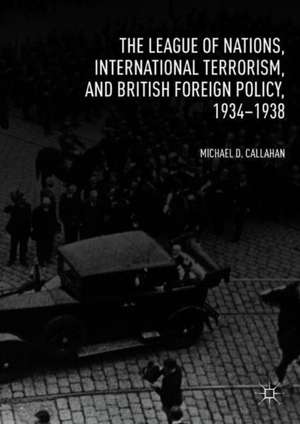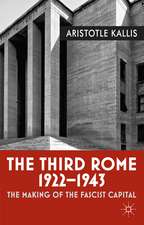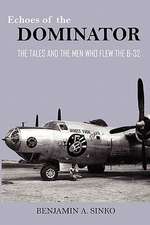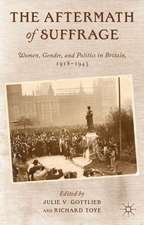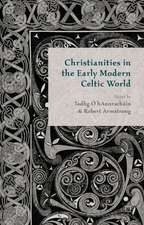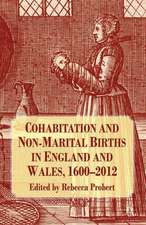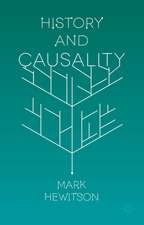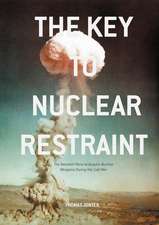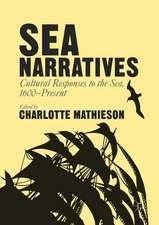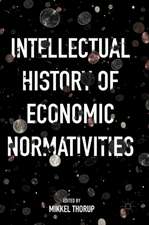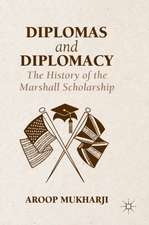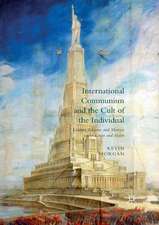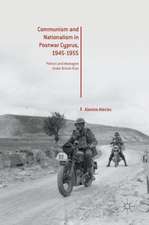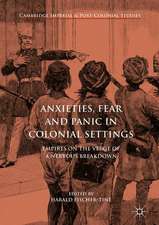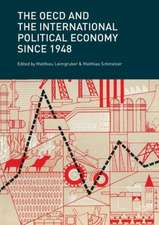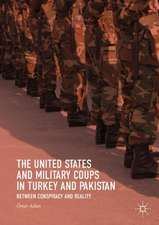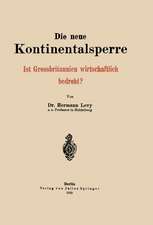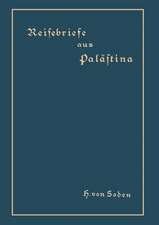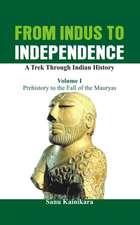The League of Nations, International Terrorism, and British Foreign Policy, 1934–1938
Autor Michael D. Callahanen Limba Engleză Hardback – 18 mai 2018
| Toate formatele și edițiile | Preț | Express |
|---|---|---|
| Paperback (1) | 525.54 lei 3-5 săpt. | |
| Springer International Publishing – 19 dec 2018 | 525.54 lei 3-5 săpt. | |
| Hardback (1) | 701.25 lei 6-8 săpt. | |
| Springer International Publishing – 18 mai 2018 | 701.25 lei 6-8 săpt. |
Preț: 701.25 lei
Preț vechi: 825.01 lei
-15% Nou
Puncte Express: 1052
Preț estimativ în valută:
134.20€ • 139.59$ • 110.79£
134.20€ • 139.59$ • 110.79£
Carte tipărită la comandă
Livrare economică 14-28 aprilie
Preluare comenzi: 021 569.72.76
Specificații
ISBN-13: 9783319771991
ISBN-10: 331977199X
Pagini: 303
Ilustrații: X, 317 p.
Dimensiuni: 148 x 210 mm
Greutate: 0.54 kg
Ediția:1st ed. 2018
Editura: Springer International Publishing
Colecția Palgrave Macmillan
Locul publicării:Cham, Switzerland
ISBN-10: 331977199X
Pagini: 303
Ilustrații: X, 317 p.
Dimensiuni: 148 x 210 mm
Greutate: 0.54 kg
Ediția:1st ed. 2018
Editura: Springer International Publishing
Colecția Palgrave Macmillan
Locul publicării:Cham, Switzerland
Cuprins
1. Introduction.- 2.“The Chief Danger in Europe at Present”.- 3. “The Most Stupid of Political Crimes”.- 4. “A War before the War”.- 5. “Can We Do Something to Dissuade Yugoslavia?”.- 6. “The Existence and Effective Use of the League of Nations”.- 7. “Acts Specifically ‘Terrorist’ in Character”.- 8. “If Eden Gives Way We Are Lost”.- 9. “A Running-Away from a Sort of Gentleman’s Understanding”.- 10. Conclusion.
Notă biografică
Michael D. Callahan is Professor of History and Frances Willson Thompson Professor of Leadership Studies at Kettering University, USA. He is author of Mandates and Empire: The League of Nations and Africa, 1914-1931 (1999/2008) and A Sacred Trust: The League of Nations and Africa, 1929-1946 (2004).
Textul de pe ultima copertă
This book examines the League of Nations, state-supported terrorism, and British foreign policy after the rise of Hitler in the 1930s. It argues that with strong leadership from Britain and France, the League made it possible for states to preserve the peace of Europe after terrorists aided by Italy and Hungary killed the King of Yugoslavia in 1934. This achievement represents the League at its most effective and demonstrates that the organization could carry out its peacekeeping functions. The League also made it possible to draft two international conventions to suppress and punish acts of terrorism. While both conventions were examples of productive collaboration, in the end, few governments supported the League’s anti-terrorism project in itself. Still, for Britain, Geneva served the cause of peace by helping states to settle their differences by mediation and concession while promoting international cooperation, a central conviction of British “appeasement” policy in the 1930s.
Caracteristici
Explores the history of the League of Nations following the rise of Hitler in the 1930s Argues that the League made it possible for states to find common ground in order to keep the peace, guided by strong leadership from Britain and France Evaluates the League’s efforts to combat state-supported terrorism through international legislation
